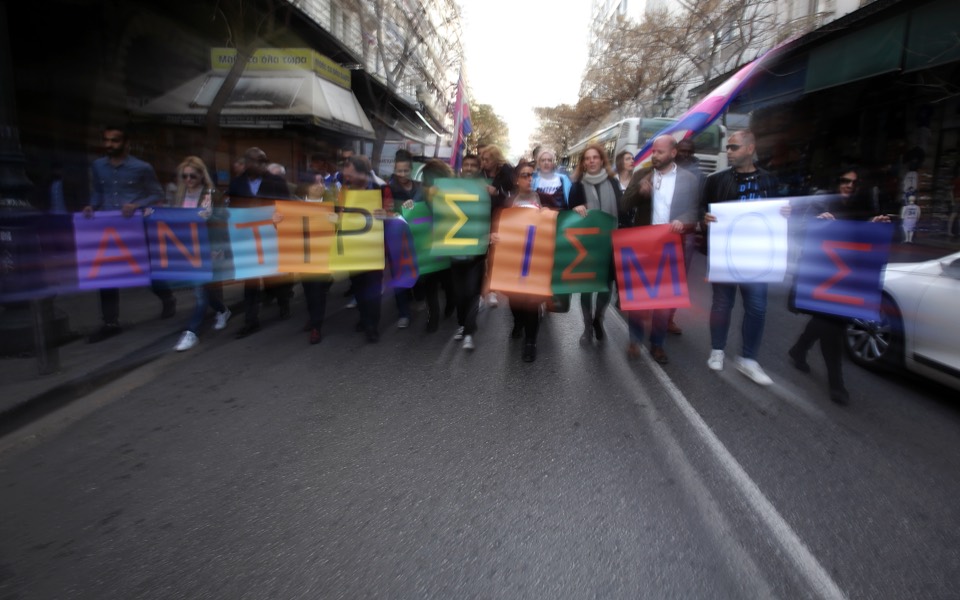Wokeness and neo-puritanism

My first brush with political correctness was surprisingly traumatic. It was during a seminar at university in England while I was developing an argument: “If we assume that one does this, then he will do that, etc.” Absorbed in my train of thought, I had not noticed the mounting anger of a fellow student, a Canadian feminist, until she exploded: “You keep saying ‘he.’ All your references are masculine! It’s sexist and unacceptable,” she berated me.
I had to get to know the aggressive version of political correctness before I would appreciate its calm necessity. Like every other movement of its kind, it employs hyperbole to underline its position, seeking to broaden the scope and reach of its protection.
I read the tirades here in Greece against political correctness – all coming from the right of the political spectrum. A significant number of people, usually constants in the mediums of public debate and whose freedom of expression has never been challenged, have discovered a new response to what they term the “tyranny of political correctness.” It’s important to remember these aren’t people at some lefty-liberal university on the West Coast of the United States, where fundamentalist political correctness has indeed been taken to an extreme and often destroys people. These are people living and writing in Greece: The country where “men” abuse their partners to protect their “honor”; where employers regard their secretaries as chattel; where homosexuals are referred to in the vilest of terms; where the children of migrants – like our pole-vaulting champion Emmanuel (Manolis) Karalis – end up sobbing on the school bench from the cruelty of their fellow classmates or are subjected to racist slogans and expletives from hyper-patriotic Greeks.
Those compatriots of ours who are so hyper-sensitive to political correctness, however, are not bothered about such things. They consider them normal, if not necessary. They scoff at the “obsessiveness” of the “progressives” and “social justice warriors” who made such a fuss over the publication of a list of “foreign” kids’ names. They pen public letters about the dangers to the nation if LGBTQI get the same rights as other citizens. They don’t have a problem with the fact that some hyper-nationalists that belong to the mainstream majority revile and despise minority groups and weaker members of our society, but with the fact that certain “obsessive social justice warriors” are calling these people out.
Sure, a lot of extreme and crazy things have been done in the name of political correctness. From knocking historical figures off their literal and figurative pedestals, like Thomas Jefferson because he owned slaves, to the censoring of Classical works of art by the zealots of neo-puritanism. The collateral damage is huge: irreverent art and literature, half of Homer, Shakespeare, Monty Python and the Bible. Woody Allen. The theory of “structural racism” crushes individualism and responsibility. Treating people as “victims” or “victimizers” solely on the basis of their racial identity does away with three centuries of Enlightenment.
That said, the initial core of political correctness is correct. It is a constant reminder that we live in complex and pluralist societies and must develop an acceptable public vocabulary of mutual coexistence and mutual respect. We must be attentive and sensitive to things that may hurt others, and mindful of the historical and collective memories they may carry on their shoulders.
I remember once telling an African American friend at Oxford that I found his obsession with race somewhat excessive. His response shut me up: “You don’t know what it’s like growing up and knowing that every day you’ll hear some comment about the color of your skin, that you’ll be subjected to body searches and even violence by the police on the street because of racial profiling.” Likewise, I would add, I don’t know what it feels like to be a woman who needs to keep looking over her shoulder when she’s walking alone at night.
Precisely because we live in liberal societies, filtering our speech and behavior should be a product of personal choice and not coercion. Our words are loaded, they carry weight and have consequences; they can disparage, lash and harm. We should be bathing our words in the font of empathy.
The “woke” among us are trying to raise a wall protecting our fellow humans who are admittedly weaker by publicly lambasting verbal violence and racist and abusive language.
A humanitarian education, empathy, mutual respect and simple social courtesy would have solved the issue of political correctness, without us needing its more extreme manifestations and dictates. It would have also spared us its neo-puritanism.
George Pagoulatos is a professor at the Athens University of Economics and Business and director general at the Hellenic Foundation for European and Foreign Policy (ELIAMEP).





